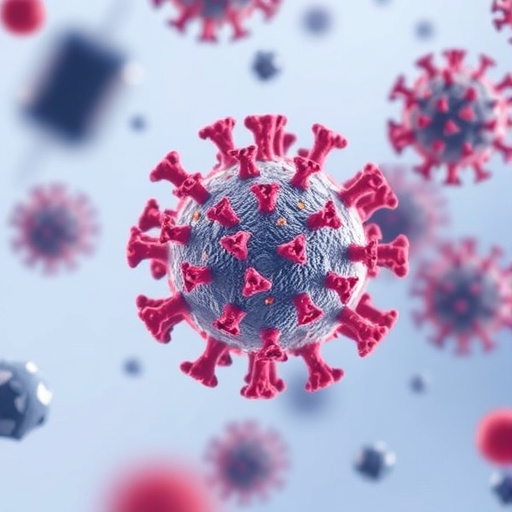In a groundbreaking study that challenges existing notions of immune protection following COVID-19 vaccination, researchers from Nagoya University have revealed compelling evidence that individual antibody responses to mRNA vaccines vary dramatically over time, with significant implications for vulnerability to breakthrough infections. This comprehensive investigation tracked antibody titers in over 2,500 individuals for an extended period of 18 months, uncovering four distinct immune response patterns and offering a novel framework to predict susceptibility to SARS-CoV-2 infection post-vaccination.
The study begins by acknowledging a perplexing observation witnessed globally: despite receiving the same vaccination regimen, individuals exhibit highly variable immune protection. Two healthcare workers vaccinated simultaneously may initially demonstrate robust antibody responses, yet six months later, one remains uninfected while the other succumbs to COVID-19. The Nagoya University team aimed to decode this disparity by conducting a longitudinal analysis of antibody dynamics, emphasizing the critical role of monitoring immune trajectories rather than relying on one-time measurements.
Utilizing an innovative combination of extensive serological data and AI-driven mathematical modeling, the researchers classified antibody responses after the primary vaccination series and the first booster dose into four discrete categories. These groups were designated as durable responders, who maintained consistently high antibody levels; rapid-decliners, characterized by an initially high response followed by swift waning; vulnerable responders, marked by initially low antibody titers that rapidly diminished; and intermediate responders exhibiting moderate and steadily declining immune activity. This typology challenges the prevailing assumption that a strong initial response uniformly equates to prolonged immunity.
A particularly striking finding was the identification of the “rapid-decliner” cohort. Despite their impressive initial seroconversion, members of this group lost protective antibody levels more quickly and experienced earlier breakthrough infections compared to others. Senior author Professor Shingo Iwami emphasized that the danger lies in overreliance on single-time-point IgG antibody tests, which failed to capture the velocity of decline and the associated increased risk. It was only through careful serial measurement over months that these patterns emerged, highlighting the need for longitudinal surveillance in immunological assessments.
Beyond the four response phenotypes, the research illuminated the pivotal role of IgA(S) antibodies—immune molecules critical for mucosal defense in the respiratory tract. Participants who contracted breakthrough infections were found to possess lower serum IgA(S) concentrations a few weeks post-vaccination. Given the strong correlation between serum and nasal IgA(S) levels demonstrated in this study, blood tests could potentially serve as reliable surrogates to assess mucosal immunity, offering an accessible metric to stratify infection risk.
The incidence of breakthrough infections varied modestly among groups but held noteworthy trends: durable responders experienced infections at a rate of approximately 5.2%, whereas rapid-decliners and vulnerable responders encountered slightly higher rates near 6%. These differences, though subtle, underscore biological heterogeneity in vaccine-mediated protection and hint at the complex interplay of host factors influencing susceptibility—ranging from genetic predispositions to environmental influences such as stress, sleep quality, and concurrent medications.
Methodologically, the team leveraged artificial intelligence algorithms to process the vast dataset, enabling precise classification and prediction of antibody decay patterns. This approach marks a significant advancement over traditional epidemiological studies by integrating machine learning with immunological surveillance. The artificial intelligence framework allowed for a dynamic modeling of immune kinetics, a novel strategy vital for capturing the temporal dimensions of vaccine response.
The implications of these findings extend far beyond academic curiosity. The delineation of discrete immune trajectories suggests that personalized vaccination schedules, including optimized timing for booster administration, could dramatically improve protection for those identified as rapid-decliners or vulnerable responders. This personalized approach contrasts sharply with uniform booster recommendations, offering a pathway toward more efficient and equitable vaccine allocation.
However, the authors caution against immediate widespread implementation of antibody monitoring for COVID-19 vaccination management. Factors such as test cost, accessibility, standardization of assays, and clinical utility must be thoroughly evaluated. Professor Iwami stressed that further research is essential to elucidate the biological mechanisms driving differential antibody waning and to validate whether tailored vaccination strategies indeed translate into better clinical outcomes.
Additionally, the study raises intriguing questions about the role of other immunological components, such as T-cell mediated responses and memory B-cell populations, in conferring durable protection. While antibody titers provide a valuable proxy, comprehensive immunity encompasses multiple layers that warrant integrated analysis. Future investigations may incorporate multi-omics profiling and cellular immunity assays to build a holistic understanding.
Importantly, this research resonates amid the ongoing evolution of SARS-CoV-2, as emerging variants continually test vaccine efficacy. Understanding individual differences in immune durability acquires heightened urgency given the potential for reduced vaccine effectiveness over time. The ability to stratify risk by antibody kinetics and mucosal immune markers offers a critical tool in pandemic management and preventive healthcare.
In summary, this landmark study from Nagoya University pioneers a novel paradigm in vaccine immunology by systematically characterizing longitudinal antibody responses to COVID-19 mRNA vaccines. It reveals that a single snapshot measurement is insufficient to capture true risk profiles, advocating for dynamic monitoring to inform personalized booster strategies. Such insights pave the way for precision immunization, ultimately aiming to reduce breakthrough infections and improve public health outcomes worldwide.
Subject of Research: Patterns of longitudinal antibody responses following COVID-19 mRNA vaccination and their association with risk for subsequent SARS-CoV-2 infection.
Article Title: Longitudinal antibody titers measured after COVID-19 mRNA vaccination can identify individuals at risk for subsequent infection.
News Publication Date: 17-Sep-2025.
Web References:
Science Translational Medicine Article DOI
Image Credits: Kyoko Kojima
Keywords: COVID-19 vaccination, antibody kinetics, mRNA vaccines, breakthrough infections, IgA antibodies, immune response heterogeneity, longitudinal study, AI-based immunological modeling, personalized vaccination, booster strategy.
Tags: breakthrough infections after vaccinationCOVID-19 vaccine immune responsesdurable responders and rapid-declinershealthcare workers COVID-19 vaccination outcomesimmune protection patterns post-vaccinationimplications of antibody titer variabilitylongitudinal antibody response analysismRNA vaccine antibody dynamicsNagoya University COVID-19 studypredicting SARS-CoV-2 susceptibilityserological data and AI modelingvariability in vaccine effectiveness





